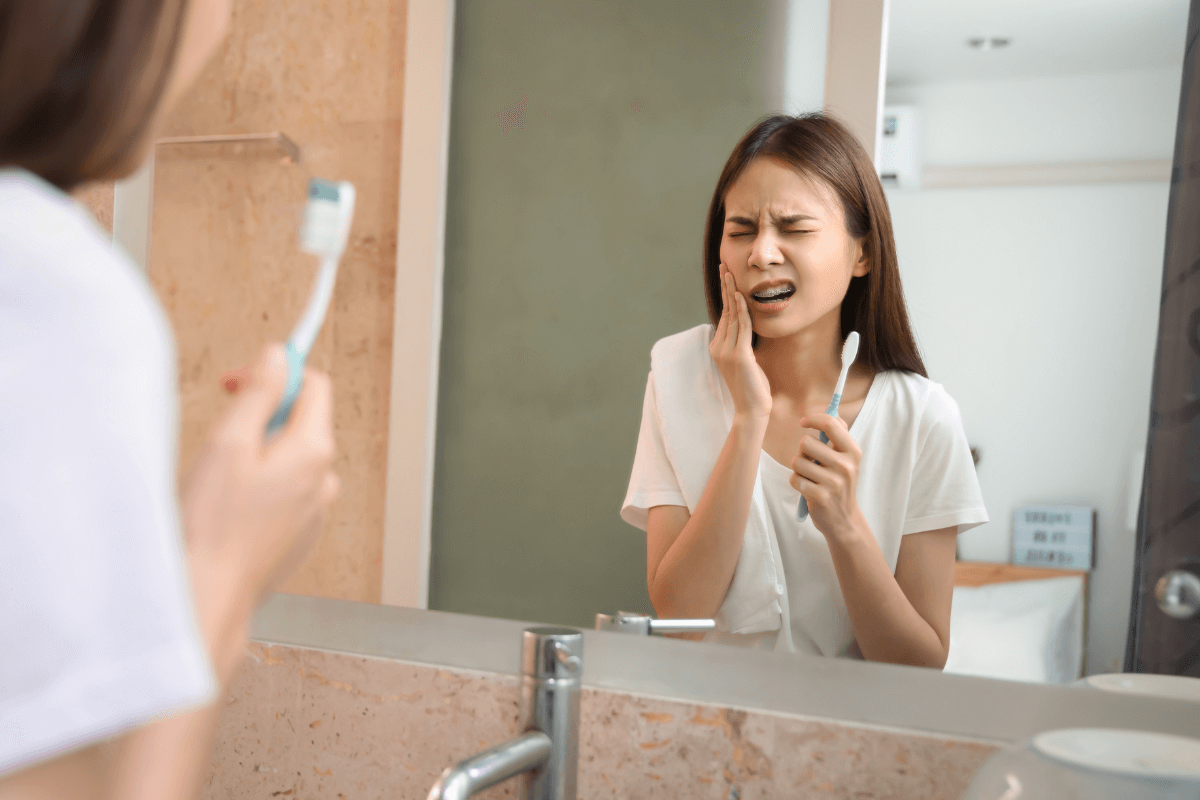
Have you ever experienced discomfort or agony after eating hot soup or ice cream? If so, you are not by yourself. While discomfort from eating hot or cold meals may indicate the presence of a cavity, it is also frequent in persons with sensitive teeth.
Dentin hypersensitivity, also known as tooth sensitivity, is what it sounds like: teeth that become painful or uncomfortable in reaction to particular stimuli, such as hot or cold temperatures.
It can affect one tooth, many teeth, or all of the teeth in one person, and it can be a short-term or long-term issue. While sensitive teeth might have a variety of causes, the majority of them can be readily cured by changing your oral hygiene routine.
In this article, we are going to throw light on Teeth Sensitivity and its symptoms. So, let’s get started with understanding Tooth Sensitivity.
What is Teeth Sensitivity?
When teeth are subjected to hot or cold temperatures, acidic foods, beverages, or both, the nerves in the tooth get irritated, causing pain or discomfort. Additionally, while eating or chewing, flossing, or brushing your teeth, you may experience sensitivity.
Enamel, a hard layer that protects teeth above the gum line, is used as this term. Cementum, a similar material, serves to shield the roots. The tooth's dentin layer is covered by the enamel and cementum. Dentin is equally rigid, but it contains tiny channels called tubules. The pulp, which is the vital or living portion of the tooth and contains nerves and blood vessels, is located in the core of the tooth.
Dentin is made visible by erosion of the cementum or enamel. The dentin's tubules are capable of stimulating and irritating the teeth's nerves, which can cause discomfort or agony.
Medical emergencies are infrequently caused by sensitive teeth. But dental decay, which can result in cavities and their problems, and sensitivity are also related. Additionally, it may be connected to tooth trauma, which if addressed, can result in infection.
What Indicates Your Teeth Sensitivity? - Major Symptoms of Teeth Sensitivity
Other symptoms that differ depending on the underlying disease, ailment, or condition may also be present in addition to sensitive teeth. Many times, symptoms that affect the teeth might also affect other body systems.
Oral Symptoms that could accompany sensitive teeth:
Along with other mouth-related complaints, sensitive teeth can include:
- Poor breath (halitosis)
- Variations in taste
- A discharge or pus
- Recessed gums
- Gums that are swollen and have reddened
Additional Symptoms that may coexist with sensitive teeth:
Teeth sensitivity may come with symptoms of other bodily systems, such as:
When expanding or closing the mouth, there are clicking or popping sounds.
- Heartburn
- Indigestion
- Jaw pain
- Face muscles are hurting.
- Sinus or Headache
- Trismus (inability to fully open mouth) (inability to fully open mouth)
- Sudden Loss of weight
Serious Signs and Symptoms of that could be life-threatening
Sometimes, having sensitive teeth can be accompanied by other symptoms that point to a serious or even life-threatening disease that needs to be assessed right away in an emergency room. If you or someone you are with experiences any of the following symptoms visit your Local Dental Clinic immediately.
- Spoiled stools (the blood may be red, black, or tarry in texture)
- Change in attentiveness or degree of consciousness, such as dozing off or being unresponsive
- Having trouble breathing
- Extreme fever (higher than 101 degrees Fahrenheit)
- Reduced jaw mobility, which might make it more difficult to open or close your mouth
- Extreme pain
- Inflammation of the jaw
- Black or bloody stuff in the vomit (resembling coffee grounds)
What Causes Teeth Sensitivity? - Major Causes of Teeth Sensitivity
Tooth sensitivity is a condition that can be passed down genetically or developed under stressful circumstances. Whatever the circumstance, if it is resolved quickly, there won't be any dangers. The several root causes of this uncomfortable ailment are as follows:
- Too much pressure during flossing and brushing results in worn-out enamel.
- Teeth with cracks and fractures that expose some dentin components
- Intake of foods and drinks with acids on a regular basis
- Regular grinding of teeth, even while sleeping
- Oral hygiene issues that leave all microorganisms behind
Tooth sensitivity might result from other medical issues. For instance, acid might go from your stomach to your mouth as a result of bulimia and gastroparesis. Your enamel will be gradually destroyed by corrosive acid, exposing increasingly delicate tooth layers.
What to do with Teeth Sensitivity Symptoms? - Diagnosis of Teeth sensitivity
Schedule a visit with your dentist if you suddenly notice that your teeth are sensitive. Your teeth can be examined for potential issues including cavities, loose fillings, or receding gums that might be the source of the sensitivity.
At the time of your regular dental cleaning, your dentist will perform this. Your teeth will be cleaned, and a visual inspection will be performed. They can order an x-ray of your teeth to rule out potential causes like cavities, as well as use dental tools to touch and feel your teeth to check for sensitivity.
Why Visiting the Dentist is Important in the case of Teeth Sensitivity?
Although the symptoms can be exclusively associated with tooth sensitivity, the terrible fact is that they are sometimes indicative of other illnesses. The fundamental cause of dental pain or discomfort is a stimulated nerve(s). Then, you must ask yourself, "Why do I have sensitive teeth?" Why might this stimulation take place?
It can just be that you haven't been cleaning your teeth properly, but it could also be that you have problems with your teeth like cracks, decay, or cavities that need to be treated by a dentist. The same way that such symptoms can appear is as pain and discomfort.
As a result, it can be challenging to assess independently. When there is a hole in your mouth that needs to be filled, you wouldn't want to try to make your teeth less sensitive because that will just make the problem worse. That is why we always advise that you visit the dentist.
How to Get rid of Teeth Sensitivity? - Treatment for Teeth Sensitivity
Desensitising Toothpaste:
When used repeatedly, desensitizing toothpaste might occasionally assist reduce the discomfort brought on by sensitive teeth. There are numerous nonprescription products available. Consult your dentist about the ideal product for your dental care.
Fluoride:
To build tooth enamel and lessen pain, your dentist may administer fluoride to sensitive parts of your teeth. Additionally, he or she might advise using prescription fluoride at home in a customized tray.
Desensitisation or Bonding:
Sensitive exposed root surfaces may occasionally be addressed by coating them with an adhesive resin. Potentially necessary is a local anesthetic.
Gum Transplant Surgery:
A little piece of gum tissue from your mouth can also be extracted and connected to the problematic area if your tooth root has lost gum tissue. This will lessen sensitivity and safeguard exposed roots.
The Root Canal Treatment:
Your dentist may suggest a root canal to treat issues with the soft core of the tooth if your sensitive teeth are really painful and other treatments are ineffective (dental pulp). Although it could appear like a significant procedure, this method is thought to be the best one for getting rid of sensitive teeth.
Frequently Asked Questions about Teeth Sensitivity
1. Why did my teeth become sensitive overnight?
Your teeth's exposed nerves or deteriorating enamel are the two main causes of sensitive teeth. You can feel a brief, intense flash of pain when you consume something that is exceedingly hot or cold.
2. Why is the cold so painful to my teeth?
When the enamel erodes and the dentine-ending nerves are more exposed, pain signals are sent to the brain if powerful substances, such as extremely cold food, acidic food, or extremely sweet food, come into touch with them.
3. What Nutritional deficit makes teeth sensitive?
It has been established that some vitamin deficits can lead to sensitive teeth. One of these is calcium, which is known to build our bones. Cavities brought on by a vitamin D deficiency can make teeth sensitive. Finally, gum disease risk is increased by vitamin B12 deficiency. You run the risk of experiencing discomfort from sensitive teeth if your gums start to split or recede from your teeth.
4. Are Painkillers effective for sensitive teeth?
Traditional painkillers may not provide relief for sensitive tooth pain. Oral analgesics and desensitizing toothpaste, however, might be momentarily helpful.
5. Is Teeth sensitivity inherited?
For the majority of people, tooth sensitivity is not inherited. However, in a small percentage of cases, some persons may have hereditary abnormalities such as dentinogenesis imperfecta or enamel hypoplasia.
Go Back

















